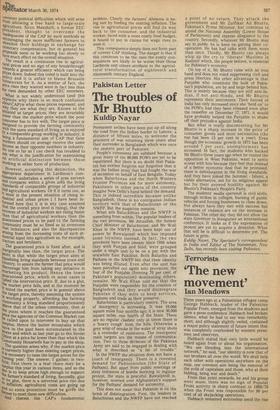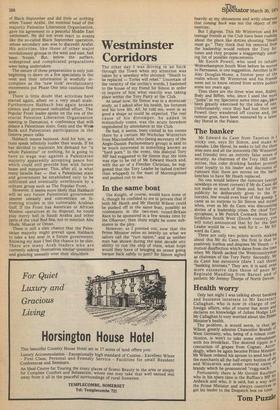Terrorists
'The new movement'
Ian Meadows
Three years ago at a Palestinian refugee camp George Habbach, leader of the Palestine Popular Front, emerged from the shadows and gave a press conference. Habbach had broken silence, what he had to say was remarkably short, and although slightly veiled, contained a major policy statement of future intent that was completely overlooked by western pressmen and observers.
Habbach stated that very little would be heard again from or about his organisation. "We are blending into the international network," he said, "our identity is now that of our brothers all over the world. We shall help each other with operations anywhere on the map, our common aim being the removal of the evils of capitalism and those, who at their bidding, bring war and death."
From that point onwards, he and his group went mute; there was no sign of Popular Front activity in sharp contrast to 1969/70 when the Front was responsible for 90 per cent of all skyjacking operations. Habbach remained motionless amid the rise of Black September and did little or nothing when Yasser Arafat, the nominal head of the majority Palestine Liberation Organisation, gave his agreement to a peaceful Middle East settlement. He did not even react to events like the so-called Black September operation, whose secondary aim was to discredit Arafat. His activities, like those of other major revolutionary groups in the west and east, had been 'frozen.' But, below the surface, widespread and complicated preparations were being undertaken.
The nature of these preparations is only just beginning to dawn on a few specialists in the west and their information is woefully incomplete as the 'new look' revolutionary movements put Phase One into cautious first gear.
There is little doubt that activities have started again, albeit on a very small scale. Furthermore Habbach has again broken silence and promised redoubled effort. The Popular Front leader spoke on the eve of the crucial Palestine Liberation Organisation meeting in Damascus, a conference that will. debate a Palestinian state, Gaza and the We84Bank and Palestinian participation in the Geneva peace talks.
Habbach means business. And for him, actions speak infinitely louder than words. If he has decided to maintain his demand for "a whole Palestine" or nothing, he is going to have to wage war against a Palestinian majority apparently accepting peace but which could still provide him with future bases and manpower. This, after all, is what many Israelis fear — that a Palestinian state and government be established only to be infiltrated and eventually overthrown by a militant group such as The Popular Front.
However, it seems more likely that Habbach. will let any future Palestinian government simmer uneasily and concentrate on fomenting trouble in the vulnerable Arabian Gulf. If the Front has American or African Moslem operatives at its disposal, he could play merry hell in Saudi Arabia and other parts of the vital Red Sea, not to mention Abu Dhabi, Muscat or Oman.
There is still a slim chance that the Palestinian majority might prevail upon Habbach to take a key seat in a future government. Knowing my man I feel this chance to be slim. There are many Arab leaders who are currently asking themselves similar questions and glancing uneasily over their shoulders.



































 Previous page
Previous page